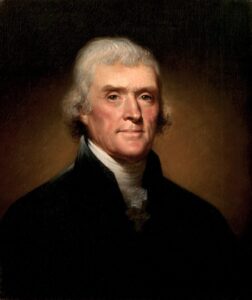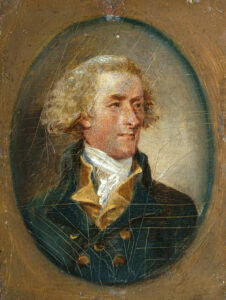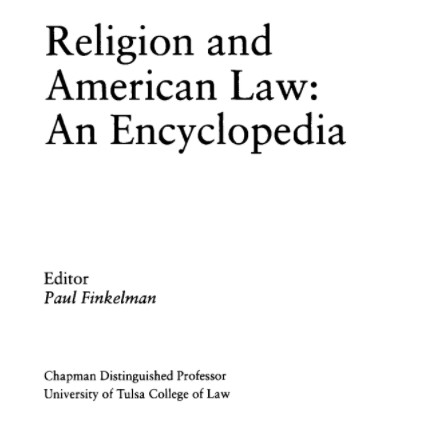Thomas Jefferson and Religion

from:
 Thomas Jefferson opposed established religion throughout his adult life. In 1777, as a young legislator in the Virginia General Assembly, he introduced the original version of the Statute of Religious Freedom, finally brought to passage by his friend James Madison in 1786. Along with drafting the Declaration of Independence and founding the University of Virginia, authorship of the statute was one of the three great achievements Jefferson wanted listed on his tombstone. During his presidency, Jefferson continued to uphold the First Amendment’s “wall of separation” between church and state, rebuffing clerical efforts to involve the federal government in national fasts and other religious observances. “I believe with you that religion is a manner which lies solely between man and his God,” Jefferson wrote the Baptists of Danbury, Connecticut, in his famous letter of January 1, 1802.
Thomas Jefferson opposed established religion throughout his adult life. In 1777, as a young legislator in the Virginia General Assembly, he introduced the original version of the Statute of Religious Freedom, finally brought to passage by his friend James Madison in 1786. Along with drafting the Declaration of Independence and founding the University of Virginia, authorship of the statute was one of the three great achievements Jefferson wanted listed on his tombstone. During his presidency, Jefferson continued to uphold the First Amendment’s “wall of separation” between church and state, rebuffing clerical efforts to involve the federal government in national fasts and other religious observances. “I believe with you that religion is a manner which lies solely between man and his God,” Jefferson wrote the Baptists of Danbury, Connecticut, in his famous letter of January 1, 1802.
To messers. Nehemiah Dodge, Ephraim Robbins, & Stephen S. Nelson, a committee of the Danbury Baptist association in the state of Connecticut.
Gentlemen
The affectionate sentiments of esteem and approbation which you are so good as to express towards me, on behalf of the Danbury Baptist association, give me the highest satisfaction. my duties dictate a faithful and zealous pursuit of the interests of my constituents, & in proportion as they are persuaded of my fidelity to those duties, the discharge of them becomes more and more pleasing.
Believing with you that religion is a matter which lies solely between Man & his God, that he owes account to none other for his faith or his worship, that the legitimate powers of government reach actions only, & not opinions, I contemplate with sovereign reverence that act of the whole American people which declared that their legislature should “make no law respecting an establishment of religion, or prohibiting the free exercise thereof,” thus building a wall of separation between Church & State. Adhering to this expression of the supreme will of the nation in behalf of the rights of conscience, I shall see with sincere satisfaction the progress of those sentiments which tend to restore to man all his natural rights, convinced he has no natural right in opposition to his social duties.
I reciprocate your kind prayers for the protection & blessing of the common father and creator of man, and tender you for yourselves & your religious association, assurances of my high respect & esteem.
Th Jefferson
Jan. 1. 1802.
Jefferson’s extreme tolerationism grew out of his faith in the rationalistic precepts of natural religion. He was convinced that the enormous power of organized religion depended on the clergy’s success in mystifying and obfuscating otherwise self-evident truths. In the Christian tradition, the doctrine of the Trinity—the idea that three equals one— constituted the most egregious example of mystification. Exploiting popular credulity and pretending privileged access to God’s Word, clergymen demanded unquestioning faith and obedience from their flocks. For Jefferson the rule of “priestcraft” was the religious equivalent to the social and political tyranny of monarchy and aristocracy: In both cases, common folk were misled into believing that inequality, not equality, was man’s natural state. The destruction of the old regime meant the elimination of all invidious distinctions and privileges. An end to superstition, bigotry, and intolerance was crucial to the success of this revolution. The moral foundation of republican self-government was the people’s virtue, vigilance, and common sense.
Religion and ethics were virtually indistingiushable for Jefferson. Although raised as an Anglican, the young Jefferson was exposed to enligtenment influences at Wlliam and Mary, including the revival of interest in the teachings of the Roman Stoic and Epicurean philosophers. Embracing this ethical framework, Jefferson believed that the pretensions of any religious sect could be determined by asking whether or not it provided a practical design and inspiration for the good life. The dangerously divisive effects of sectarianism were particularly conspicuous during Jefferson’s formative years as a Revolutionary statesman, when evangelical “dissenters” struggled for religious freedom. In this case, of course, sectarian strife centered on the question of state support: Disestablishment promised to depoliticize religion and so enable the warring sects to live in peace and harmony. But if his fight for toleration in Virginia confirmed his lifelong reputation as a champion of the evangelicals, Jefferson had serious misgivings about the compatibility of evangelical Christianity and republican government. The dangers of a privileged religious establishment were obvious—and remediable. But how could freedom of thought be secured against an intolerant majority, carried away by sectarian fervor? This question troubled Jefferson increasingly in his later years as he sought to protect his privacy and peace of mind against the tyranny of “public opinion.”
Jefferson’s concerns about evangelical bigotry—grounded in his profound antipathy to “Calvinist” doctrine—dated back to his youth. Calvinists epitomized sectarian irrationality because in preaching salvation by faith alone they radically devalued “good works,” or ethical behaviorn as a means of securing eternal life. Jefferson believed that the doctrine of predestination, by emphasizing man’s incapacity to determine his own fate, subverted personal morality and justified arbitrary power. Presbyterians were particularly noxious to Jefferson because their arbitrary and antithetical theology was combined with powerful institutional structures^ in Massachusetts and Connecticut their Congregationalist allies continued to enjoy the benefits of state support. Not coincidentally, as partisan controversy escalated in the wake of the French Revolution, Presbyterian and Congregational preachers rallied to the Federalist cause, denounced Jefferson for his infidelity and Jacobin tendencies.
Religion and ethics were virtually indistinguishable for Jefferson. Although raised as an Anglican, the young Jefferson was exposed to &i]i^tenment influences at William and Mary, including the revival of interest in the teachings of the Roman Stoic and Epicurean philosophers. Embracing this ethical framework, Jefferson believed that the pretensions of any religious sect could be determined by asking whether or not it provided a practical design and inspiration for the good life. The dangerously divisive effects of sectarianism were particularly conspicuous during Jefferson’s formative years as a Revolutionary statesman, when evangelical “dissenters” struggled for religious freedom. In this case, of course, sectarian strife centered on the question of state support: Disestablishment promised to depoliticize religion and so enable the warring sects to live in peace and harmony. But if his fight for toleration in Virginia confirmed his lifelong reputation as a champion of the evangelicals, Jefferson had serious misgivings about the compatibility of evangelical Christianity and republican government. The dangers of a privileged religious establishment were obvious—and remediable. But how could freedom of thought be secured against an intolerant majority, carried away by sectarian fervor? This question troubled Jefferson increasingly in his later years as he sought to protect his privacy and peace of mind against the tyranny of “public opinion.”
Jefferson’s concerns about evangelical bigotry—grounded in his profound antipathy to “Calvinist” doctrine—dated back to his youth. Calvinists epitomized sectarian irrationality because in preaching salvation by faith alone they radically devalued “good works,” or ethical behavior as a means of securing eternal life. Jefferson believed that the doctrine of predestination, by emphasizing man’s incapacity to determine his own fate, subverted personal morality and justified arbitrary power. Presbyterians were particularly noxious to Jefferson because their arbitrary and antithetical theology was combined with powerful institutional structures in Massachusetts and Connecticut their Congregationalist allies continued to enjoy the benefits of state support. Not coincidentally, as partisan controversy escalated in the wake of the French Revolution, Presbyterian and Congregational preachers rallied to the Federalist cause, denounced Jefferson for his infidelity and Jacobin tendencies.
Jefferson was ambivalent about the future of Christianity in America. Early in his career be looked forward to the triumph of reason, hopeful that popular Christianity would eventually be stripped of the superstitious folk beliefs and clerically inspired mysteries that had accumulated over the centuries. If the clergy were no longer able to invoke the state’s support in exploiting a credulous people, he believed, then their numbers and power would diminish. In a fair contest, reason would vanquish superstition. Jefferson’s advocacy of religious freedom, therefore, was originally tactical, as a means of promoting a competition that would ultimately guarantee popular enlightenment; it was not premised on the idea that all versions of Christianity were equally “true” or that it was impossible to make judgments about their truth value. Ever the optimist, the antitrinitarian Jefferson could still, late in his life (1822), predict that “there is not a young man now living in the United States who will not die a Unitarian.”
Jefferson’s expectations were not realized—the rise of Unitarianianism notwithstanding. A free competition among Christian denominations, as many clergymen had long since recognized, created optimal conditions for effective proselytizing. The proliferation of new sects such as the Disciples of Christ during the so-called Second Great Awakening promoted a profound and far reaching ‘democratization” of American Christianity. Many of Jefferson’s most ardent admirers were drawn from the ranks of self-professed “primitive” evangelical Christians whose anti-establishment appeals and radical reformist impulses in religion mirrored Jeffersonian efforts to restore American politics to republican purity. Certainly, these developments confounded Jefferson’s hopes for a dawning age of reason. Far from prefiguring the future, Jefferson’s Enlightenment faith became increasingly anachronistic and irrelevant. Yet Jefferson did not simply withdraw in confusion and consternation. To the contrary, in an effort to comprehend and accommodate to the Christianization of America, Jeffmon undertook an arduous quest for religious enlightenment.
The key figure in Jefferson’s later spiritual development was Joseph Priestley, the great English scientist and Unitarian theologian who settled in Pennsylvania. Priestley’s History of the Corruptions of Christianity (1782) juxtaposed the uncorrupted ethical teachings of Jesus to the neo-Platonic mystifications of his self-proclaimed disciples. By conceiving of Jesus as a great moralist, Jefferson could reaffirm his belief in the unity of the Godhead while vindicating his authentic “Christianity” against partisan, sectarian assaults. The publication of Priestley’s Socrates and Jesus (1803) prompted Jefferson to set forth the outlines of his mature faith in a letter to Benjamin Rush in April 1803. This “Syllabus … of the doctrines of Jesus, compared with those of others” was followed by his collections of extras from the new Testament, “The Philosophy of Jesus” (1804), and by the much more elaborate “Life and Morals of Jesus,” compiled late in his life. Imposing his own critical scheme on the Gospels, Jefferson excluded passages that introduced mysterious and miraculous elements into the record of Jesus’ moral teachings. In this way, the rationalist Jefferson could enthusiastically embrace Christianity he could also convince himself-that Christian ethics, because they were premised on the unity of mankind, constituted a profoundly progressive improvement on Classical philosophy.
Once Jefferson had successfully distinguished “Primitive Christianity” from its doctrinal and institutional corruptions, he could envisage a positive and mutually reinforcing relationship between religion and republican government. As a philosophical materialist who rejected Platonic idealism, Jefferson always believed in some form of after life; as a practical moralist, he recognized that concern for future rewards and punishments represented an essential prop to social virtue. Yet because of his lifelong antipathy to religious establishments and evangelical irrationality, Jefferson was unwilling to compromise the purity of either church or state by permitting any sort of formal institutional relationship between the two spheres. His growing misgivings about the progress of reason also led Jefferson to a more modest conception of the benefits of toleration; Toleration was less important as a means toward popular enlightenment than as a means of securing private conscience against the tyranny of public opinion.
Ironically, even in retirement, when there were no longer any political risks in alienating more conventional Christians, Jefferson was unwilling to expose his own religious views. The mature Jefferson was much more interested in upholding the sanctity of conscience as the ground of private and public life than in promoting his own version of religious truth. To proselytize, even on behalf of what had seemed to the younger Jefferson to be self-evident truths, was to foment partisan and sectarian strife while threatening the sovereignty of individual conscience. Jefferson’s spiritual quest may not have led either to a profoundly transforming conversion experience or to original philosophical formulations. But it did deepen his commitment to the principle of religious toleration. Late in his life Jefferson wrote that “I am of a sect by myself, as far as I know.” For the young Revolutionary who had looked forward to the triumph of reason over sectarian irrationality, this was a remarkable conclusion, not the least for its nonpejorative use of the word “sect.” It also represented the convergence between Jeffrson’s conception of toleration and that of earlier champions of Christian liberty such as Roger Williams—a radical Calvinist who also constituted a sea unto himself.
Bibliography
Conkin, Paul, “Jefferson’s Religious Pilgrimage,” in Jeffersonian Legacies, ed. Peter S. Onuf (Charlottesville: University Press of Virginia, 1993).
Sanford, Charles, The Religious Life of Thomas Jefferson (Charlottesville: University Press of Virginia, 1984).
Sheridan, Eugene R, Introduction, Jefferson’s Extracts from the Gospels ‘The Philosophy of Jesus’ and ‘The Life and Morals of Jesus,’ in The Papers of Thomas Jefferson, 2nd series, ed. Dickinson W. Adams (Princeton, N.J.: Princeton University Press, 1983).
